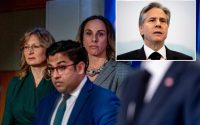DOJ inspector general says ‘potential jurisdictional issue’ hinders review of Hunter Biden cover-up claims
WASHINGTON — Justice Department Inspector General Michael Horowitz has informed Congress of a “potential jurisdictional issue” preventing him from investigating whistleblower complaints alleging a cover-up in the criminal investigation of first son Hunter Biden.
Horowitz, who is widely respected in Washington as a hard-charging and nonpartisan internal watchdog, disclosed the issue in a letter to House Republicans last month after IRS agents Gary Shapley and Joseph Ziegler said Justice Department leaders misled Congress, gave preferential treatment to the first son and steered investigators away from probing President Biden’s role in foreign dealings.
“[M]y office has taken a number of steps to assess the information [Shapley] provided,” Horowitz wrote in a letter dated July 19 to three House committee chairmen and made public Tuesday.

“In undertaking this assessment, however, we are mindful of the potential limitation on the [Office of the Inspector General]’s jurisdiction as a result of [federal law], which requires my office to refer to DOJ’s Office of Professional Responsibility (OPR) ‘allegations of misconduct involving Department attorneys, investigators, or law enforcement personnel, where the allegations relate to the exercise of the authority of an attorney to investigate, litigate, or provide legal advice.’”
“Consistent with our usual practice when such a potential jurisdictional issue arises, we consult with OPR about the matter,” Horowitz added.
“Also consistent with the OIG’s usual practice, because our assessment is ongoing, and because the allegations relate to an ongoing criminal case, I am unable to provide additional information to your Committees at this time.”

The letter was addressed to House Judiciary Committee Chairman Jim Jordan (R-Ohio), Oversight Committee Chairman James Comer (R-Ky.), and Ways and Means Committee Chairman Jason Smith (R-Mo.).
The chairmen on Tuesday responded with a request for Horowitz to be more specific about roadblocks he may be facing.
“Based on your statements and the DOJ’s pattern of politically motivated actions, we are concerned that the DOJ is limiting your office from fully investigating the disclosures provided to your office,” Jordan, Comer, and Smith wrote.

“To help the Committees understand the scope of your investigation, please provide documents and/or information sufficient to explain whether your office is (1) limited in any way from fully investigating the whistleblowers disclosures based on 5 U.S.C. § 413(b)(3) or any other law or regulation, and (2) if you are limited, how and why your office is limited. Please provide this information by September 6, 2023.”
Shapley, supported by his subordinate Ziegler, testified to the Oversight Committee last month that Attorney General Merrick Garland’s sworn claims that Delaware US Attorney David Weiss could charge Hunter Biden with crimes outside of Delaware were false, and that in fact Biden-appointed US attorneys in Los Angeles and Washington, DC, had blocked charges.
The two whistleblowers, supported by testimony from an FBI agent who worked on the case, also said that federal prosecutors tipped off Hunter’s legal team to an attempted approach for an interview in late 2020, scuttling the attempt — after also informing Hunter’s team about a planned search of a northern Virginia storage unit.

Shapley and Ziegler said prosecutors also blocked them from investigating Joe Biden’s alleged role in business dealings in places such as China and Ukraine, despite communications directly implicating him.
Hunter’s probation-only plea deal to tax and gun charges dramatically collapsed last month under scrutiny by a federal judge, resulting in Garland naming Weiss as special counsel to refile charges in jurisdictions outside of Delaware.
House Speaker Kevin McCarthy (R-Calif.) has said repeatedly this month that Republicans are moving closer to launching an impeachment inquiry into the president.


